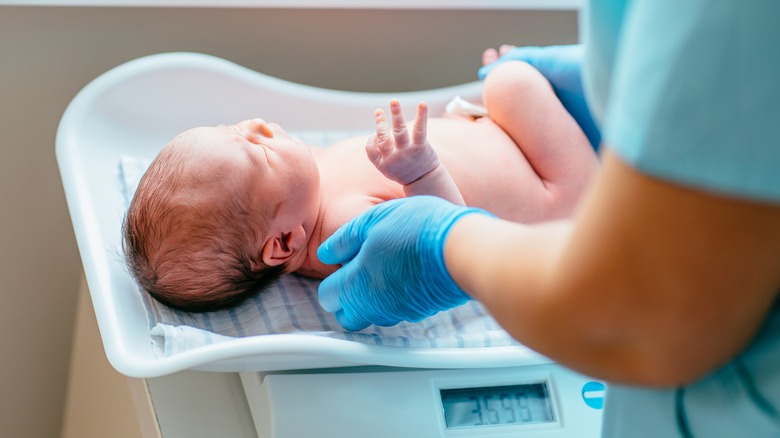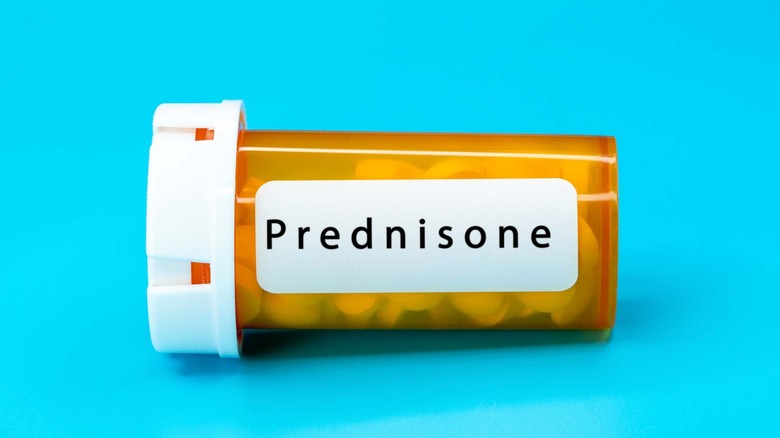Are There Risks To Taking Prednisone While Pregnant?
Few things are more exciting than the news that you've got a baby on the way. But for many expecting moms, pregnancy also comes with an onslaught of new anxieties. As you adapt to your new normal wherein your body is now a shared space, many questions might arise about whether what you've always done is safe to continue doing while your baby is on board. Am I getting enough sleep? Am I eating enough of the right things? And what about my daily dose of prednisone?
Prednisone is one of the most commonly prescribed corticosteroids — a class of synthetic steroids that closely resemble cortisol. When the body is functioning properly, the adrenal glands pump out a steady supply cortisol, a hormone that aids in the proper functioning of our immune system, reduces inflammation, maintains blood sugar, and manages stress levels (per Better Health Channel). When cortisol production is low, however, your doctor may prescribe a corticosteroid like prednisone. Even when cortisol production is normal, prednisone can be a useful anti-inflammatory drug in the treatment of severe allergic reactions, as well as conditions like arthritis, lupus, asthma, and inflammatory bowel disease (per Cleveland Clinic).
While some supplements and medications are safe to continue using throughout pregnancy, others may need to be phased out in the name of protecting your developing baby. Let's take a closer look to find out if you should keep filling your prednisone prescription, or if it's safer to steer clear until after the baby is born.
Prednisone and pregnancy
While there isn't a strong enough body of evidence to condemn the use of prednisone during pregnancy, some studies have indicated that it can come with increased risk of developmental issues. A 2005 study published in the Journal of Allergy and Clinical Immunology found that women who took the drug during pregnancy were more likely to give birth to a baby with lower birth weight than those who didn't. For that reason, women who take prednisone during pregnancy are often subject to having their babies' growth monitored throughout gestation (per National Health Service). A 2018 review published in also suggested that the use of prednisone during pregnancy slightly increased the risk of cleft lip in newborns — however, these findings have not been supported by more recent research.
While the elevated risk of developmental issues may scare expecting mothers away from taking prednisone during pregnancy, the National Health Service points out that the immune and inflammatory conditions that prednisone is often used to treat can be detrimental to the well-being of your growing baby, making a case for the continued use of prednisone during pregnancy — especially in the event that the benefits of taking it outweigh the risks it may pose.
Other side effects of prednisone
Like any other drug, prednisone comes with a list of potential side effects that can affect anyone who uses it — pregnant or not. Common side effects of corticosteroids like prednisone include weight gain, increased hair growth, mood changes, acne, sleep disturbances, muscle weakness, and dizziness (per Optum Perks). While much more rare, it also comes with the potential of more serious side effects like vision problems, fever, sore throat or cough, depression, numbness in the extremities, and seizures or muscle spasms. In the event that you experience any of the latter symptoms, it's imperative that you let your doctor know immediately.
Because higher doses and long-term use of prednisone are associated with increased risk of side effects — including developmental issues during pregnancy — you may want to talk to your doctor about slowly decreasing the amount of prednisone you take during pregnancy (per Drugwatch). If your healthcare provider determines that your condition could pose more of a threat to your baby's development than prednisone, you may be able to keep taking it as prescribed (per Optum Perks).



